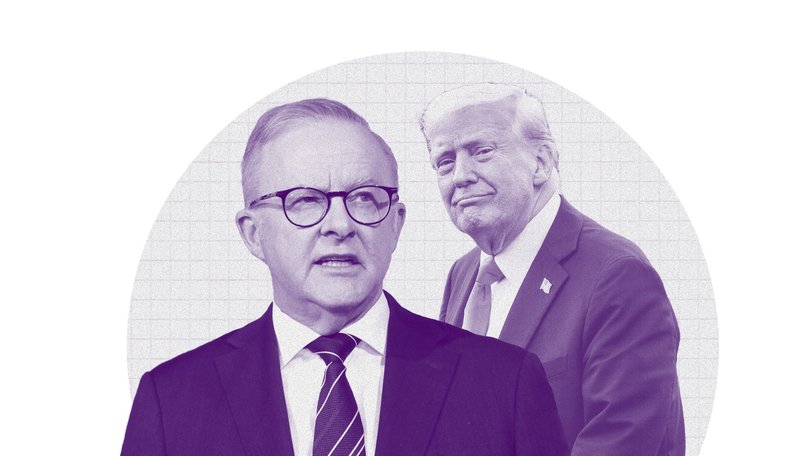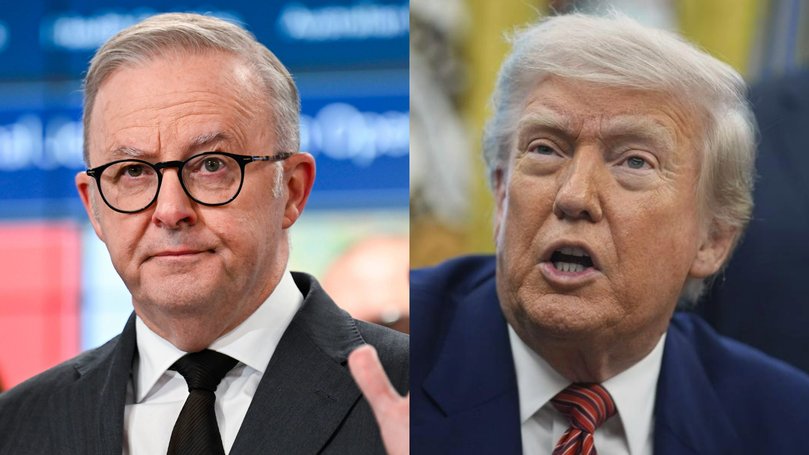ANDREW CARSWELL: Key issues on the line as Prime Minister Anthony Albanese faces the Donald Trump test
ANDREW CARSWELL: It’s easy to talk tough in the Prime Minister’s courtyard — much harder when you’re within earshot of the most powerful man on the planet, part time president, part time pugilist.

It may make enthralling viewing for neutrals, but increasingly, a meeting with Donald Trump is anything but a safe space for foreign leaders.
Whether it’s on the blue rug of his own Oval Office or a bilateral meeting at a G-something summit, the unexpected is now to be expected.
Prepare for opportunities to be exploited, weakness to be pounced upon, and past grievances replayed in real time.
Sign up to The Nightly's newsletters.
Get the first look at the digital newspaper, curated daily stories and breaking headlines delivered to your inbox.
By continuing you agree to our Terms and Privacy Policy.Barbs and insinuations will come freely. And emerging as the victor from an encounter with this iteration of President Trump is rare. He’s in no mood to play nice for diplomacy’s sake, nor to doff his cap to alliances and friendships that have spanned generations. Anyone is fair game.
The schoolyard tag-team bullying of Ukrainian President Volodymyr Zelenskyy. The sharp condemnation of “white genocide” cast at South African President Cyril Ramaphosa. The ridicule of German Chancellor Friedrich Merz’s strategy on dealing with Russia, and that short-jab remark that D-Day “was not a great day for Germany”. The nonchalant threat to annex Canada as the 51st state, sitting just a metre from incoming Canadian Prime Minister Mark Carney.
Trump will land a blow. Somewhere. And subsequently dominate the narrative.
This is the Lion’s den Anthony Albanese is about to step into. A Prime Minister derided for his weakness and policy naivety, who has spent seven months avoiding such encounters, and who has, alongside his leading diplomat Kevin Rudd and Foreign Minister Penny Wong, a long rap sheet of denigrating Trump.
“He scares the s... out of me,’’ Albanese remarked about Trump in 2017.
Yeah, we know. We can tell.
With so much at stake in his anticipated meeting between Trump at the G7 in Canada next week, this really is Albanese’s sink or swim moment.
A moment to decisively stand up for Australia against unjust trade practices that have targeted our most productive industries — our beef producers, our steel and aluminium manufacturers, our critical minerals exporters.
A moment to bat away the pointed barbs directed at Australia over its ultimate commitment to defence spending and its alliances.
A moment to negotiate on what doesn’t matter and hold the line on what absolutely does.
It’s easy to talk tough in the Prime Minister’s courtyard — much harder when you’re within earshot of the most powerful man on the planet, part time president, part time pugilist.
Success in this Trump encounter will help shore up Albanese’s tenuous standing in the eyes of still-frustrated Australians, many of whom voted for him on May 3 not because of his performance, but because they didn’t like or trust the other guy.
His support, despite his political and parliamentary ascendancy, remains a towering sandcastle in the soft sand; one wave, one tidal surge, from having its ramparts washed away.

There are some advantages already beginning to line up for Albanese in two of the four critical issues that have caused friction in the US-Australia relationship. The other two have to be managed carefully, given some of the grievances aren’t based on fact.
A 10 per cent tariff on Australian beef exports to the US is understood to be the low-hanging fruit to be negotiated away, assuming the two nations can come to an arrangement on the traceability of cattle.
Trump’s claim that US cattle are banned from being exported to Australia is false. But our strict biosecurity laws require traceability of cattle to guarantee the exported beasts aren’t born and raised in Mexico or further afield.
Increase traceability capabilities, and there is some movement at the station.
What Albanese won’t do — wisely is trade away Australia’s biosecurity standards. An outbreak of foot in mouth disease is not one he wants to have on his resume.
On critical minerals, negotiations are already in advanced stages, led by Ambassador Rudd, to sign the US up to off-take agreements or the ability to stockpile minerals necessary for defence technologies and advanced weaponry.
This should be solid ground for Albanese, given Australia has in abundance what the US sorely lacks.
That’s a potential 2-0 lead to Albanese.
Where it gets hairy is the outrageous 50 per cent tariff slapped on Australian steel and aluminium, a hangover from Trump 1.0 when rabid trade advisers Robert Lighthizer and Peter Navarro claimed Australia breached a verbal agreement to cap exports to the US, accusing it of funnelling metal through China.
The claims were fanciful then, even more absurd now, yet they’re still shaping the advice tickling Trump’s ear. It’s dangerous territory for Albanese. He’s up against a passionate argument based on pure fantasy, made tougher by the fact that both his predecessors successfully secured exemptions from tariffs.
Will the US really fall for the same trick three times?
That leaves Australia’s underwhelming defence spending of 2.03 per cent of GDP, falling well short of the 3.5 per cent benchmark the US has demanded allies meet, which leaves it prone to be derided as freeloaders in the pushback against a belligerent China and Russia.
Flashpoint?
Unquestionably.
The real question is whether Albanese can stand the heat.
